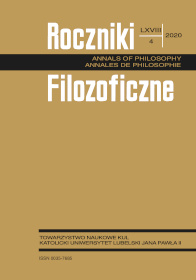Czy procesy naturalne mogą realizować cele nadnaturalne?
Can Natural Processes Realize Supernatural Goals?
Author(s): Grzegorz BugajakSubject(s): Philosophy, Special Branches of Philosophy, Philosophy of Religion, Philosophy of Science
Published by: Towarzystwo Naukowe KUL & Katolicki Uniwersytet Lubelski Jana Pawła II
Keywords: teleology; divine action; miracle; causal closure; panentheism
Summary/Abstract: The aim of the paper is to seek such an interpretation of the presence and activity of God in nature that could harmonize important truths of faith with scientific understanding of the world, governed in its evolution by chance and devoid of any direction. The search is taken in a few steps. Firstly, classic accounts of teleology are indicated, with the conclusion that the only way of the understanding an idea that the world is purposeful is that in terms of inner teleology: the world is directed not so much by God but towards God.Contemporary discussions about the possibility of God’s aims being realized in nature often concentrate on the notion of general or special divine action. Drawing on some accounts of GDA and SDA the paper supports the view that strict delimitation of what is natural and what divine in a given case is probably impossible.One of the reasons of this impossibility is captured by the principle of the causal closure of the world. With relation to this principle, a need to revise some classic accounts of the miraculous is pointed to. Particularly, “the miracle of the human” does not need any special divine interventions, any special guidance of the evolutionary processes (which are, in any case, truly random), if one accepts a hypothesis of the underdetermination of the goal of creation: If God’s aim is that a special being emerges in nature, able to maintain a conscious relation with its Creator, then such a being (called Human in theology) does not need to be a representative of the species Homo sapiens.Finally, panentheism is pointed to as a truly Christian view of the world; the world which is “fate and destiny” of God himself (Karl Rahner). In such a perspective, the details of the evolutionary development of the world cease to be relevant for religion, and religion frees itself finally from “error and superstition” (John Paul II).
Journal: Roczniki Filozoficzne
- Issue Year: 68/2020
- Issue No: 4
- Page Range: 89-109
- Page Count: 21
- Language: Polish

